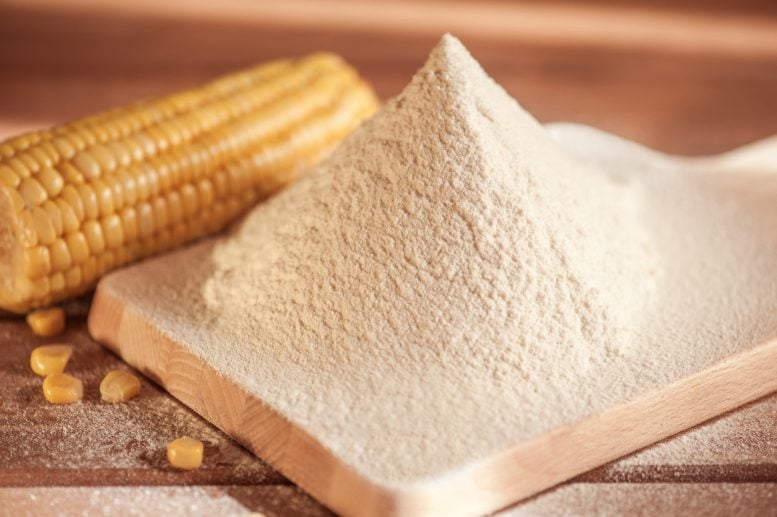
Refined cornmeal plus added corn bran significantly lowers cholesterol, according to a study. Credit: Marina Massel
The cross-over clinical trial examined the effect on the gut microbiome.
A recent randomized clinical crossover study published in Journal of Nutrition shows that replacing foods with refined corn flour and corn bran can lower LDL cholesterol levels by 5% to 13.3% within four weeks.
The study compared the effects of whole grain cornmeal, refined cornmeal and a mixture (refined cornmeal plus corn bran) and found that 70% of participants saw a significant reduction in LDL cholesterol levels when consuming the mixture. For the other cornmeal, participants did not see a decrease in LDL or total cholesterol levels, nor did they see an increase.
“People often think that dietary changes have to be drastic and significant to have a real impact on cardiovascular health and metabolic control,” said Corrie Whisner, PhD, principal investigator and associate professor in the College of Health Solutions at Arizona State University. “The bottom line is this: corn is unique and underrated.” The art and science of refining grains and making the most of corn bran can result in delicious foods that, in this case, will also deliver real results for heart health.
Functional dietary intervention
Dr. Whisner noted that the team intentionally focused the study on avoiding dramatic changes in diet to create a practical intervention that could easily be folded into a regular diet. Researchers provided study participants with baked goods to control the type and amount of cornmeal, and study participants did not increase or decrease their grain intake during the study. These baked goods were developed by a master baker who is familiar with food formulation techniques and specialty ingredients used in foods commonly found in the grocery store. Their goal in this design was to ensure that the results of the study would show how practical it can be to regularly include foods made with corn bran-enriched flour as part of a heart-healthy diet.
Surprisingly, the results did not reveal significant or consistent changes in gut microbiome diversity, which is consistent with the fact that study participants did not report gastrointestinal discomfort or changes during the interventions. Two genera, unclassified Lachnospiraceae and Agathobaculumwas significantly different by treatment and while an increase was obsd Agathobaculum (a common bacterium in the gut microbiome) during the whole grain cornmeal phase, this change was not seen in the other two phases.
“The rise of Agathobaculum may be due to the greater diversity of polyphenols found in whole grains, which have the highest antioxidant capacity (compared to wheat, oats, and rice), but the study did not identify this possibility,” Whisner said. “Nonetheless, while the effects of whole grains on the microbiota vary from person to person, some universals are generally known to be able to ferment fiber in whole grains to butyrate by microbes, and both fiber and butyrate are often associated with a healthy gut.” These results support that understanding.
The 36 study participants were all located in Phoenix, AZ, and were between the ages of 18-67. They included a mix of women (~58%) and men, all entered the study with mild to moderately elevated LDL cholesterol levels, and none took cholesterol-lowering medications during the study. During the study, participants went through each dietary intervention individually for four weeks (with at least a two-week washout period between interventions to return to baseline) to assess the effects of each intervention more evenly.
Reference: “Evaluating the effects of cornmeal product consumption on cardiometabolism and gut microbiota in adults with elevated cholesterol: a randomized trial” by Bethany Liedike, Maissa Khatib, Baharak Tabarsi, Michelle Harris, Shannon L Wilson, Carmen P Ortega-Santos, Alex E Mohr, Sonia Vega-López and Corrie M Whisner, June 14, 2024, The Journal of Nutrition.
DOI: 10.1016/j.tjnut.2024.06.003
The study was led by a team of researchers at Arizona State University, with funding from the Corn Division of the North American Millers’ Association (NAMA). NAMA did not supervise the study design, collection, analysis and interpretation of data, nor wrote and revised the manuscript for publication.
#Study #LDL #Cholesterol #Simple #Diet